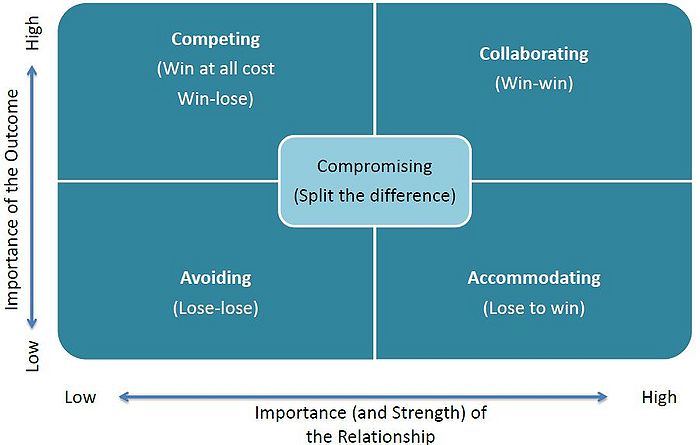Negotiation skills
To use this, first asses your relationship with the person and then the intended outcome.
1st factor: Relationship:
- Is there a relationship?
- Is it positive or negative?
- Is a future relationship desired?
- History of the relationship
- Length of the relationship
- Amount of open communication between the parties
2nd factor: Outcome
- How important?
Example of a car –if you are buying it from a dealer, you don’t really care much about the relationship with the dealer, but ifyou are buying from a friend or neighbour, the way you will approach the negotiation will be different, if you are buying the car from your mother, than you are probably more interested in the relationship thaninthe outcome of the negotiations
Avoiding: neither aspects are important, so you withdraw from active negotiating or avoid the negotiation entirely –disputes are costly, in terms of time, energy, relationship, and in some cases the outcome nor relationship matter, so the best option is just to drop it –negotiation is waste of time! One good example of when this might occur is when you have a better option elsewhere, e.g. you are buying a house, the seller of house A has too high a price, and is inflexible, and another seller of a different also interesting property is more flexible and has a better starting price, it would be a waste of time to continue negotiating with the first dealer. If other party insists in negotiating, than you might consider going to accommodating strategy.
Accommodating: “ok, you are right, and I have peace” –focus is on strengthen the relationship and when the outcome is not important and pursuing the negotiation may lead to damaging the relationship –short term -it is expected that giving something away now will give you a better change to achieve your goal in the future. For example, not pushing for a higher salary in three month review which will put you in a better position to ask for a raise in 6 months.
Competitive strategy: this is the usual way we think of negotiation, bargaining. Short term focus, where the relationship does not matter. We/they attitude, minimize similarities, lack of trust, even conflict. This occurs when:
- One-time negotiation
- Future relationship may not be important
- Relationship exist but is poor
- Other party has a bad reputation for bargaining and you use this strategy as defense
When to enter a negotiation
Negotiation Techniques
"missing graph"
Read more
Fisher et al. Getting to Yes: Negotiating Agreement Without Giving In
